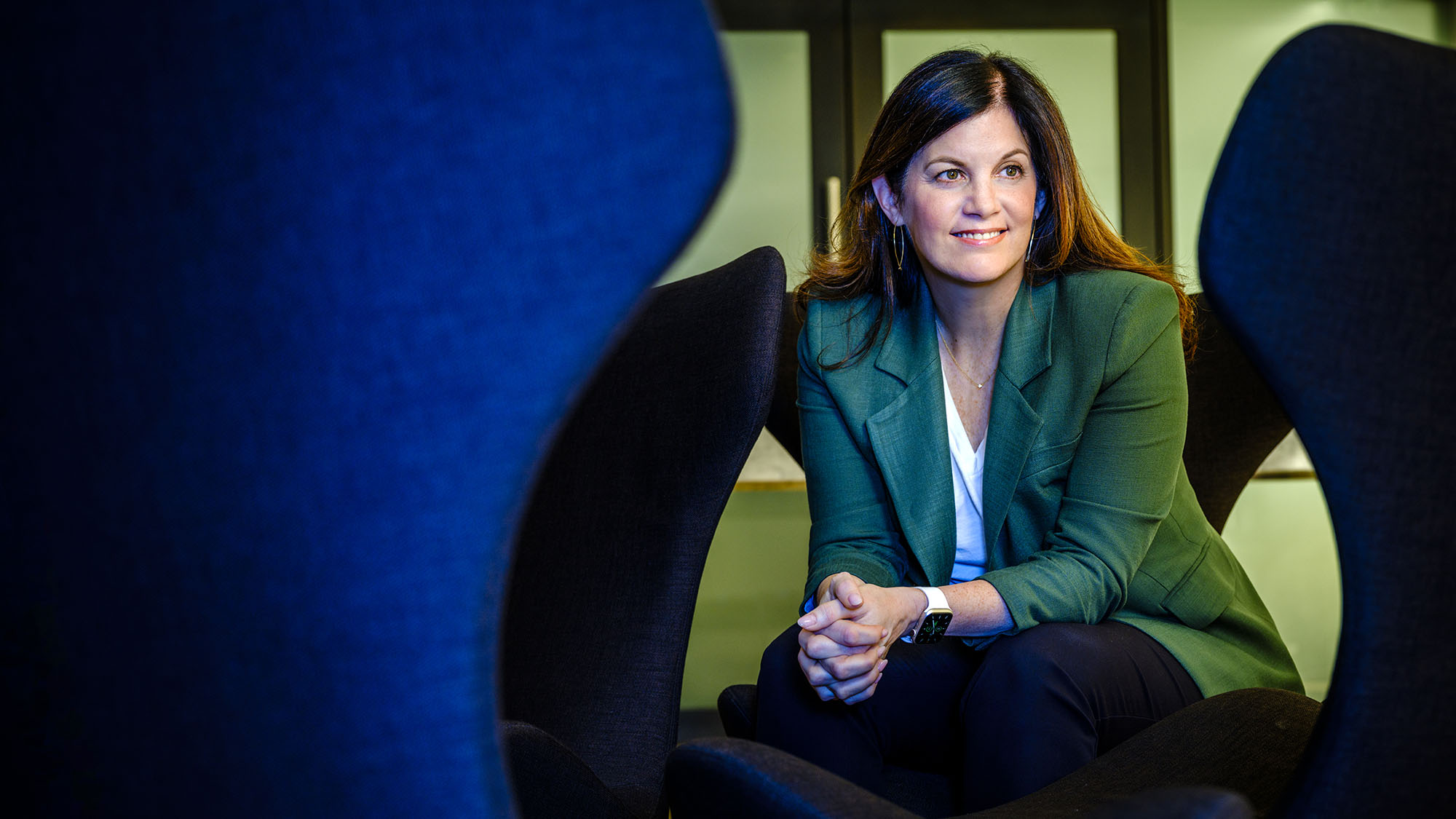
Photo by Chris Sorenson
The New Thought Leader
Weber Shandwick Exec Kelly Sullivan is excited about AI and is shaping how organizations use it
Kelly Sullivan is an artificial intelligence evangelist.
Two years after ChatGPT made generative AI publicly accessible, she’s helping organizations put what she calls “the ultimate technology disruption” to work. “I get real excited about this,” she says at the start of a recent interview. “You might have to tell me to rein it in.”
Sullivan (’94,’96), an executive vice president at the global communications agency Weber Shandwick, works in a division called Futures. The self-proclaimed “AI accelerator” has simplified a Fortune 500 company’s cumbersome access to business intelligence by designing a bot that employees access through Microsoft Teams. They’ve built a “sandbox” to safely experiment with generative AI tools without training public AI models. And their narrative intelligence tools analyze how information and misinformation spread through networks—and who, or what, is doing that spreading.
“There’s no shortage of people pontificating about whether generative AI is going to ruin the world or be our savior. Everybody’s talking about that,” Sullivan says. “And they’re important conversations. Our charter is to dig into the platforms, to understand what they mean for our work, and ultimately, the future of comms.”
Q&A
With Kelly Sullivan, Executive Vice President at Weber Shandwick
COM/365: What’s the history of the Futures team?
Kelly Sullivan: When our chief innovation officer asked me to partner with him on this about five years ago, to help leaders decode tech-fueled media change, I jumped at the chance. Our charter is to help our clients—whether you’re a healthcare innovator or a global nonprofit or a consumer brand—to think about navigating technology disruption. It wasn’t originally the intent to focus on AI. But we realized that it was supercharging everything in our orbit—media fragmentation, new influence, immersive experiences. Technology disrupting communications isn’t new, but this time it’s much faster, it’s much more existential. So it’s never been a more
exciting time to do what we do.
COM/365: How does Futures fit into Weber Shandwick?
Kelly Sullivan: We’re a media lab that’s all about clients. This is not a group of people researching cool stuff and trying new tools for the sake of it. We are all about the applications and implications of generative AI. Some clients will come to us and say, “We don’t understand what generative AI means to our business. Can you help?” But others are saying, “I have a problem with x. What do you think we should do?” How do we figure out what’s keeping a client up at night, and how do we fix it? That’s kind of our jam.
COM/365: So you were thinking about AI even before ChatGPT went
public in 2022?
Kelly Sullivan: Yes. For us, that moment was awesome because it took a conversation that may have been more on the fringes and really put it front and center. It has been quite a whirlwind in the last two years.
COM/365: What do you say to someone who’s hesitant to use
generative AI?
Kelly Sullivan: I totally get it. I used to feel that way. There are important things we all must be vigilant about—ethical use and confidentiality are just a couple. Once you get into the platforms, when you see how important it is to get the prompts sharp, how important your own perspective is to generating meaningful outputs, when you realize that the value comes from having an exchange with the platforms versus a transaction, it changes everything. It continues to amaze me—the impact and the possibilities and the new applications that we’re just starting to realize.
COM/365: What sort of requests do you get from clients?
Kelly Sullivan: When we started Futures, the questions were surprisingly consistent. How do I orient to this overwhelming thing? How do I help a team think about this totally new vector in the work that we do? How do I make the work better today? Over the last six to eight months, the questions have started to get sharper. Clients might ask us to upskill their whole staff, to help them apply AI tools to their strategic comms works. That’s particularly interesting, because it’s not so much a technology problem as a culture problem. They’re also asking about things like machine readability. What happens when people don’t have Google open as much on their
desktop? What happens when people are going to LLMs [large language models] versus search engines?
COM/365: Do you have a favorite project you’ve worked on?
Kelly Sullivan: One project our Mexico colleagues led that I just love was for a news organization called Animal Politico. They wanted to raise awareness about mis- and disinformation during an election cycle. They thought, “We have a moment to do this in a way that will stand out.” So they created a fact checker. Anyone could throw a story in and it would tell them if it was true or false, using AI. If the system said the story was false, it went to a team of designers who used MidJourney [an AI art tool] to create incredibly visceral images that they posted in a Gallery of Lies. This was a really powerful way to help people understand what’s true and what’s false by creating an unmissable moment that people couldn’t turn away from.
COM/365: How do you help clients navigate the ethics of AI usage?
Kelly Sullivan: It’s a huge part of what we do. This is a major change for how we do things and how clients do things. It’s one of the reasons we don’t use just one platform. We want to be constantly looking at how everyone is revisiting their guidelines and protocols to make sure everything we do is returning the most ethical results and we’re not falling prey to bias that can exist in systems. We have brought on some partners with specific expertise to help us dig into that.
COM/365: How do you use AI in your workday?
Kelly Sullivan: I use ChatGPT as a thought partner. For example, “Here’s something that I just wrote—the audience is this, here’s what I’m trying to convey, What points am I missing?” I never use exactly what comes out, but it helps me think. I’m also regularly experimenting with new agents. The latest mindblower? NotebookLM. Have you tried the podcast generator? Wow. It’s glitchy, but it certainly gets you thinking about what’s possible.
Sometimes I’m running from meeting to meeting and I’m stuck. What ChatGPT produces is 80 percent crap, but it’s something to respond to. Sometimes responding to, as opposed to initiating, can really help get my
brain moving.
COM/365: In education, there’s a tension between the value of learning to use AI tools and the opportunities they create to cheat. Is
there a balance to strike?
Kelly Sullivan: We’re all still figuring this out—and, for sure, there is a balance to be found. AI absolutely changes the learning dynamic, and I think we’re going to have to figure out how to help students use the tools in ways that help them learn. I believe there are many opportunities to use generative AI to expand our opinions and perspectives as opposed to replacing them.
We have a Futures Fellows program that’s open to college students, graduate students and recent grads. Last summer, they all came to this role with what we started calling the “electric fence perspective” on generative AI. One fellow went to journalism school and was told, “If you use it, it’s plagiarism.” Another was advised they could use it in one class but not in another. Overwhelmingly, they were told, “Stay away!” But in the professional business universe, it’s not just acceptable, it’s increasingly expected that you’ll use gen AI to fuel your work—and do so strategically and ethically. So, indeed, the balance is TBD.
COM/365: What’s on the horizon?
Kelly Sullivan: There’s lots cooking. One thing that’s exciting is the work around narrative intelligence. That is understanding how a topic or a conversation is advancing through information networks and who is driving that. Are they people? Are they bots? Are they of a particular political party? Understanding what makes something go from zero to zeitgeist is really interesting.
This interview has been edited for clarity and brevity.



